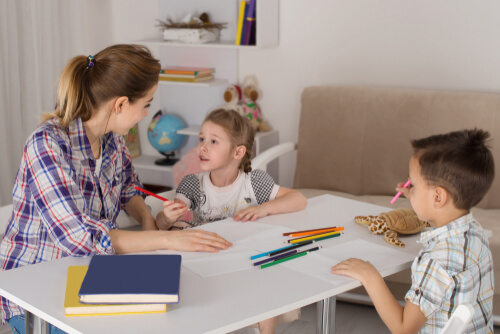How Can We Improve Our Communication with Children?
If you are like me, communication with children can be extremely frustrating. Endless questions, unfollowed instructions, the blank look on their faces when we remind them of something we said earlier, their ability to remember a promised biscuit, yet they are forgetting a request to bring something. We spend their early years willing them to talk more, and in later years hoping they will just be quiet.
The fact is, our children are by no means perfect conversation partners, but then again the same is true for me. I list some facts below that are true for me, and I guess true for many adults that may give a little insight, build a little understanding, and create a little empathy for the little people in our lives.
4 Facts About How We Communicate – and What They Teach Kids
1. If I don’t write it down, I will definitely forget.
I have a terrible memory, and so my whole life is run on to-do lists, calendars, and post-it notes. It’s due to a combination of being too busy or distracted to listen, listening then immediately forgetting, and listening but forgetting later on. Right now, I know there are about 26 things on my to-do list, but I couldn’t tell you what one of them was without looking at it. Does any of this sound familiar to you?
The thing is, as adults we have hopefully developed strategies to help us listen, remember, and later recall. Some try to remember a person’s name for the first time by linking it to someone else we know, while others repeat the address in their head a few times to help it stick, or they count out lists on fingers or use technology and writing.

However, our children don’t often have these strategies at their disposal. They either haven’t learned them or aren’t developed enough to use them. So when we ask them to get three things from the kitchen, what they did at school, what they need for the school trip, or what the name of their new teaching assistant is it’s no wonder they struggle. They are still learning to direct their attention, block out distractions, take on sentences of increasing length, and recall information.
We can improve our communication with children if we reflect on those facts. We can help them by teaching them simple strategies like counting on their fingers, repeating instructions out loud to help retention, showing them how to draw a picturized to-do list, and teaching them silly rhymes and songs to retain new information.
2. I assume people can read my mind.
My husband continually has to remind me he can’t read my mind. I often assume that he knows how my day has been, that he knows about that awful email I received, that he can predict what I want for dinner, that he “knows what I mean” in a conversation. We all fall into the trap with people that we know well, assuming they know us enough to read between the lines, take the hints, get the jist. Well our children do the same.
The brains of younger children are actually wired this way. This is called the ‘theory of mind.’ To start with, children struggle to understand that we don’t all think and feel the same thing at the same time. Over time they learn that mommy may be happy while they feel bored, or that daddy may be excited while they feel scared. As they get older it gets even more complicated because people might say and do something while feeling something different, e.g. my sister might say she’s “fine” while she is actually feeling sad, or a friend might cry with happiness one day and sadness the next.

Our children are on an ongoing path of discovery not only of their own feelings and thoughts, but also of everyone else’s. They will struggle with the fact that mommy didn’t automatically know they really wanted mashed potatoes for dinner, that they wanted the red cup not the blue one, or that daddy doesn’t automatically know they are feeling worried about something at school. We have to help them learn, understand, and communicate.
There are ways to improve communication with your children! Try and talk about feelings during family time so your child learns that people have different feelings from each other, talk and ask about each other’s days, and in tricky situations verbalize to your child that you don’t know what they are thinking and feeling in their head and that they can help you help them by talking, showing, and explaining. You can even use a speech learning app like Speech Blubs, which has some cool sections about emotions to help your child understand what you want them to communicate.
Boost Your Child’s Speech Development!
Improve language & communication skills with fun learning!

3. I could talk for England.
Most of us love talking. Even if we don’t fancy standing up and talking in front of a large group, most of us love to chat with our friends and family, sharing our thoughts, ideas, feelings, and experiences. When people ask me why I studied to be a Speech and Language Therapist, I (sarcastically) answer that it’s pretty much a degree in talking, so I thought I’d be pretty good at it.
For our children, talking, language, and conversation is still very new and very exciting! They will have spent the first few years of their lives watching you talk with others without being able to themselves, and have feelings, needs, and ideas that they haven’t had the language with which to communicate them. Finally, they suddenly have the ability to speak and join in, to make people laugh, to share their ridiculous ideas, and show they are smart, funny, and opinionated. They can finally ask the question they have been burning to ask and make choices that people understand. It’s no wonder that once they get going, they don’t stop!

It can be very, very easy to find the never-ending talking frustrating, but when you can, step back and enjoy it. Language is the key to your little person’s world and they are making the most of it. Appreciate the communication with your children! You can help them learn social rules about times to speak and not to speak by modeling and talking about turn-taking and waiting. But make sure you stop and listen, because they will learn that their voice is being heard, that they have something to say, and that what they say is important.
4. I Google stuff all the time!
Statistics show that the average person Googles something about 1,200 times per month, and if you’re anything like me I bet that number is higher! Today alone, I Googled how to get to a friend’s house, how many grams there are in an ounce, the name of a song on the radio, the opening times of Sainsbury’s, and at what age a baby should start wearing sunscreen. I ask millions of questions a day . . . and so do our children.
At any time, in every supermarket in the country, there will always be one child in the next aisle asking their parents, “Can I have this? Why? What’s that? Who was that mommy? What is that lady doing? Can I have a biscuit?” We have all heard them, they are an essential part of parents’ communication with children. To your child, you are Google! You are the all-knowing source of all their information. Everything they don’t know (which is a lot) and everything they want to know will probably be sourced through you. You are the gatekeeper of their world of learning and language. This can be incredibly tedious!

Again, take a deep breath and listen. Listen to what they want to know. They are trying to figure out the world in which they find themselves. So much of what they see and experience in their day will feel like the first time for them. They are sponges for knowledge that they want to learn. They want to understand and fundamentally want to be more like you, and so they want to know absolutely everything you know, and the only way they can do it . . . is to ask!
So, this week in the middle of a busy day full of questions, where they don’t seem to be listening, while they are requesting the biscuit you promised them 12 hours ago, and they are telling you the same story for the millionth time . . . stop, listen, and respond. This is the time to improve your communication with your children! If you do it, then they will learn to do it. It’s a golden time of learning and growing where you are the be-all and end-all of their world. Take full advantage of it. It won’t last forever.
